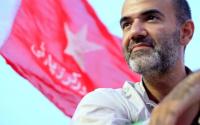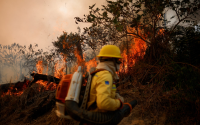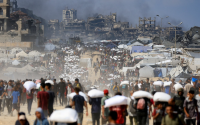12 September 2004The Independent
Disastrous weather is set to continue for at least another six months, it was officially announced yesterday, as Hurricane Ivan headed for the Cayman Islands and Cuba after leaving at least eight people dead in Jamaica.
The US government confirmed that a new El Niño is about to strike, bringing torrential rain and droughts around the world. Meanwhile, Ivan developed winds of 155mph. Jamaica escaped a direct hit, but still suffered extensive damage. So far, at least 34 people have lost their lives, mostly in Grenada.
Over the next two days both Tony Blair and Michael Howard - in an unprecedented double act - will make major speeches describing climate change as one of the greatest threats facing civilisation. They will set out programmes for combating global warming, and call for the rapid development of clean, renewable sources of energy.
Niños usually kill more people worldwide even than bad hurricane years, and the announcement by the US government's National Oceanic and Atmospheric Administration (Noaa) presages more natural and human disasters stretching at least into the early months of next year.
"El Niño conditions have developed in the tropical Pacific and are expected to last through early 2005," said Jim Laver, director of the Noaa's Climate Prediction Centre.
During an El Niño, warm water flows eastwards across the Pacific, bringing heavy rain to the US West Coast and most of Central and South America. By contrast Australia, Indonesia and parts of north-east and southern Africa usually suffer drought. Europe is relatively unaffected.
The last big El Niño in 1997-98 cost hundreds of lives and caused $34bn (£19bn) in damage worldwide, partly through flooding to Chile, Ecuador and Bolivia and partly through failing harvests in Australia, the Philippines and Indonesia. A more recent, milder one in 2002-03 caused the worst Australian drought in a century.
So far, the new one looks more like 2002-03 than 1997-98 but climatologists stress that all are different. The oceanic phenomena, like hurricanes, are growing more frequent. Research suggests that they are occurring nearly three times as often as 300 years ago, and some scientists believe that there is a link with global warming. Tomorrow Michael Howard will call on Tony Blair to use his relationship with President Bush to persuade him to join the international effort to control the climate change. He will say: "No one can opt out of the fight against global warming. This means persuading the Americans to join the battle. Their involvement is essential for effective action."
In a surprise move - since his party has been sceptical about building wind turbines in the countryside - he will commit the Conservatives to a rapid expansion of renewable energy. He particularly supports solar, wave and tidal power, growing energy crops and building windmills offshore.
He will also promise an urgent energy-saving drive and to ban HFCs, chemicals used in fridges that contribute powerfully to global warming.
Mr Blair - who will speak to an audience of business- men and environmentalists on Tuesday - last week held a rare meeting with the leaders of Friends of the Earth, the Green Alliance, Greenpeace, The Royal Society for the Protection of Birds and WWF-UK to seek their ideas.
He is determined to use his forthcoming chairmanship of both the EU and the G8 group of the world's most powerful nations to revitalise international action and is considering pushing for agreement on a level of warming that the planet must not be exceed.






